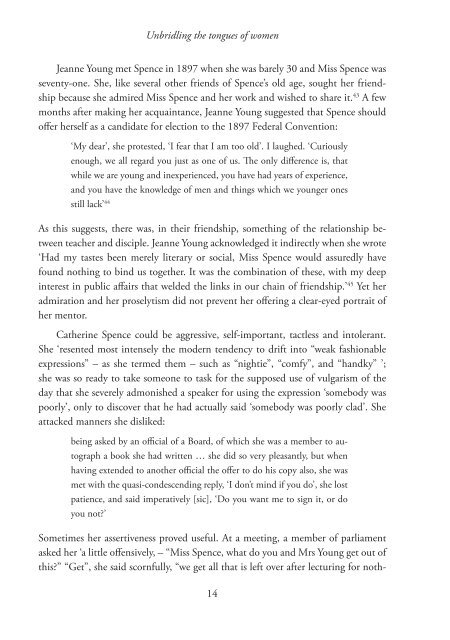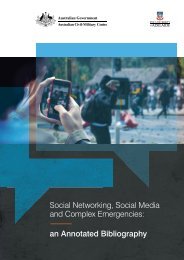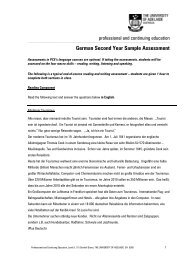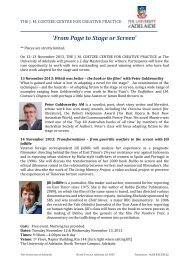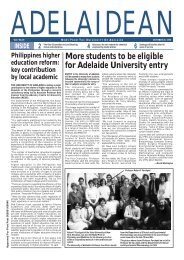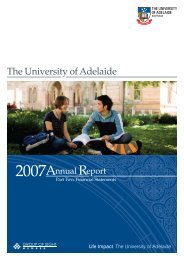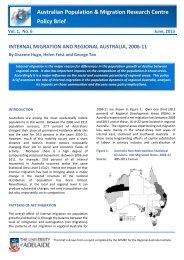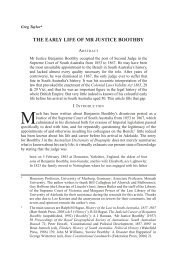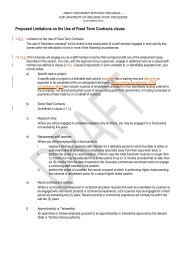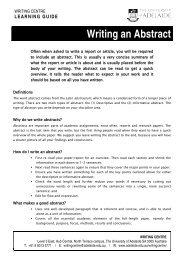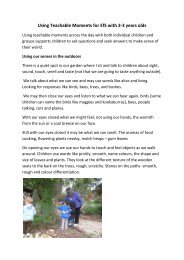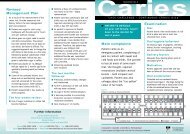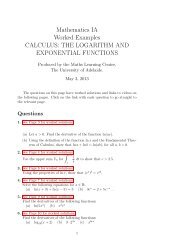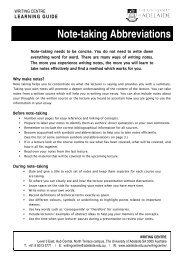Unbridling the Tongues of Women - The University of Adelaide
Unbridling the Tongues of Women - The University of Adelaide
Unbridling the Tongues of Women - The University of Adelaide
Create successful ePaper yourself
Turn your PDF publications into a flip-book with our unique Google optimized e-Paper software.
<strong>Unbridling</strong> <strong>the</strong> tongues <strong>of</strong> women<br />
Jeanne Young met Spence in 1897 when she was barely 30 and Miss Spence was<br />
seventy-one. She, like several o<strong>the</strong>r friends <strong>of</strong> Spence’s old age, sought her friendship<br />
because she admired Miss Spence and her work and wished to share it. 43 A few<br />
months after making her acquaintance, Jeanne Young suggested that Spence should<br />
<strong>of</strong>fer herself as a candidate for election to <strong>the</strong> 1897 Federal Convention:<br />
‘My dear’, she protested, ‘I fear that I am too old’. I laughed. ‘Curiously<br />
enough, we all regard you just as one <strong>of</strong> us. <strong>The</strong> only difference is, that<br />
while we are young and inexperienced, you have had years <strong>of</strong> experience,<br />
and you have <strong>the</strong> knowledge <strong>of</strong> men and things which we younger ones<br />
still lack’ 44<br />
As this suggests, <strong>the</strong>re was, in <strong>the</strong>ir friendship, something <strong>of</strong> <strong>the</strong> relationship between<br />
teacher and disciple. Jeanne Young acknowledged it indirectly when she wrote<br />
‘Had my tastes been merely literary or social, Miss Spence would assuredly have<br />
found nothing to bind us toge<strong>the</strong>r. It was <strong>the</strong> combination <strong>of</strong> <strong>the</strong>se, with my deep<br />
interest in public affairs that welded <strong>the</strong> links in our chain <strong>of</strong> friendship.’ 45 Yet her<br />
admiration and her proselytism did not prevent her <strong>of</strong>fering a clear-eyed portrait <strong>of</strong><br />
her mentor.<br />
Ca<strong>the</strong>rine Spence could be aggressive, self-important, tactless and intolerant.<br />
She ‘resented most intensely <strong>the</strong> modern tendency to drift into “weak fashionable<br />
expressions” – as she termed <strong>the</strong>m – such as “nightie”, “comfy”, and “handky” ’;<br />
she was so ready to take someone to task for <strong>the</strong> supposed use <strong>of</strong> vulgarism <strong>of</strong> <strong>the</strong><br />
day that she severely admonished a speaker for using <strong>the</strong> expression ‘somebody was<br />
poorly’, only to discover that he had actually said ‘somebody was poorly clad’. She<br />
attacked manners she disliked:<br />
being asked by an <strong>of</strong>ficial <strong>of</strong> a Board, <strong>of</strong> which she was a member to autograph<br />
a book she had written … she did so very pleasantly, but when<br />
having extended to ano<strong>the</strong>r <strong>of</strong>ficial <strong>the</strong> <strong>of</strong>fer to do his copy also, she was<br />
met with <strong>the</strong> quasi-condescending reply, ‘I don’t mind if you do’, she lost<br />
patience, and said imperatively [sic], ‘Do you want me to sign it, or do<br />
you not?’<br />
Sometimes her assertiveness proved useful. At a meeting, a member <strong>of</strong> parliament<br />
asked her ‘a little <strong>of</strong>fensively, – “Miss Spence, what do you and Mrs Young get out <strong>of</strong><br />
this?” “Get”, she said scornfully, “we get all that is left over after lecturing for noth-<br />
14


